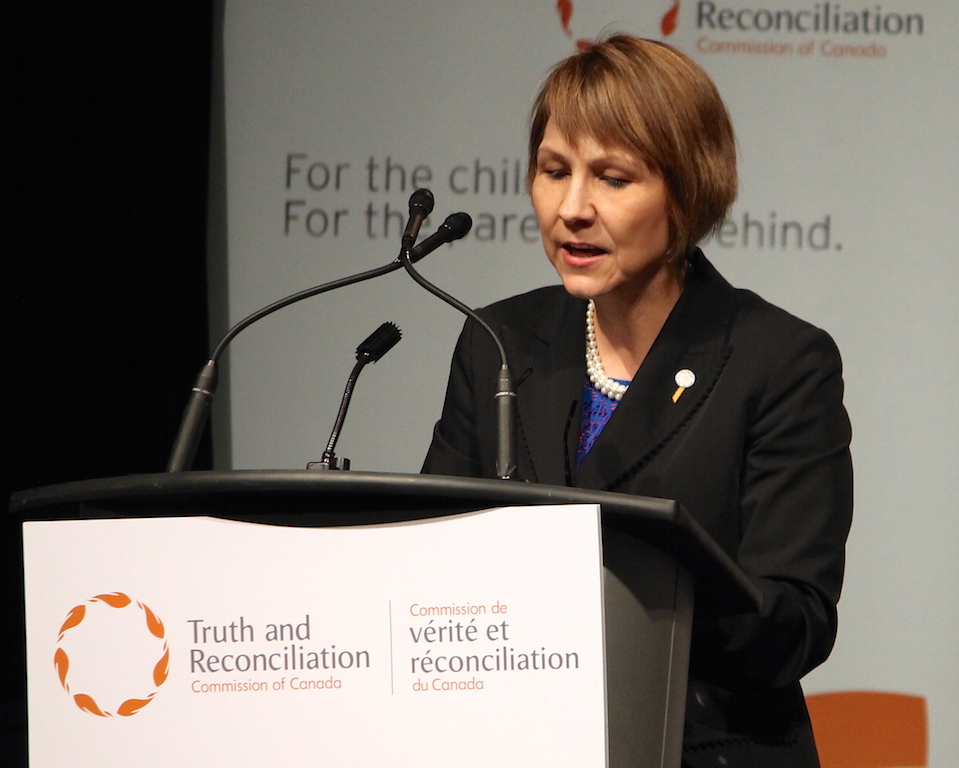Indigenous child advocate Cindy Blackstock was awarded the Canadian Labour Congress (CLC) award for Outstanding Service to Humanity at the congress’s 2017 national convention in Toronto last week.
Blackstock, the executive director of the First Nations Child and Family Caring Society of Canada, has devoted her career to fighting for equal treatment for First Nations children.
Speaking to delegates on May 9, Blackstock dedicated the award to these children, calling them “the real heroes of this country.” In one of the world’s richest countries, children living in First Nations reservations often can’t access education, health care or basics of life, like clean drinking water, because of racial discrimination.
Blackstock urged attendees to take action to end systemic racial discrimination against Indigenous children. The 150 anniversary of Confederation is a “crossroads,” Blackstock said, that invites Canadians to consider the legacy of racial discrimination and how it keeps the country captive.
“Through all of these years, First Nations children have loved all of you enough to believe that you would do the right thing,” Blackstock told the crowd. “That you are good people. That you won’t stand for it anymore. And one day, you will do what’s needed so that this country rises up.”
The day to rise up is now, Blackstock said.
To help illustrate just how critical the need is, Blackstock talked about the time she recently spent with a mother who had to re-wash catheter tubes for her daughter because the government wouldn’t give them enough money for new ones. Her daughter was getting urinary tract infections. Her kidneys were being scarred.
Children are not only more vulnerable to discrimination. They are often more perceptive to it. A girl, who wasn’t Indigenous, once told Blackstock discrimination is “when the government doesn’t think you’re worth the money.”
The government hasn’t thought First Nations children are “worth the money” for years, Blackstock told the more than 2,000 delegates in attendance.
Blackstock said she thought things were going to change last year when the Canadian Human Rights Tribunal found the federal government is discriminating against First Nations families and children living on reserve. Ineffective funding systems mean people living in these communities don’t receive adequate child and family services. The government was ordered to end its discriminatory practices. It has not. The government has been issued two non-compliance orders since January 2016. Another order is pending, she said.
The government gives out “a teaspoon of equality at a time towards First Nations children,” Blackstock said. The worst part of this “incremental inequality” is that, because people are discriminated against in so many parts of their lives, they feel they have to be thankful for whatever small things they receive.
“It’s not enough to smile and discriminate. It hurts as much as when you scowl.”
Current inaction is the next part of the federal government’s long history of discriminating against First Nations children in care. Blackstock reminded delegates of Peter Henderson Bryce, a public health official who in 1907 criticized the federal government for failing to give children in residential schools proper medical care, even during the tuberculosis crisis. Government neglect continues today. The Truth and Reconciliation Commission’s 94 Calls to Action, released in 2015, clearly show the need for improved child welfare for Indigenous children, Blackstock told her audience. The first five calls to action relate to improving child welfare.
Blackstock criticized popular ideas that ending racial discrimination against First Nations children is too complicated because they live in remote communities or because the leaders of those communities don’t manage money they receive from the federal government well. Neither argument works, Blackstock said. The government sends teams to provide clean drinking water to countries around the world, so it should be able to do the same a few hours north of Toronto. She acknowledged some First Nations have issues with managing their budgets but, “I live in Ottawa,” she told the crowd to growing laughter. “We are not alone.”
Spending scandals routinely plague the federal government. At the start of the Idle No More movement in 2013, activists coined the Twitter hashtag #Ottawapiskat to compare the federal government’s spending to how money is spent in First Nations communities, like the northern Ontario reservation Attawapiskat. The hashtag is still used today to describe such things as how much of their family vacation the Trudeaus expensed.
CLC president Hassan Yussuff told Blackstock the CLC will write to the government about its non-compliance with the 2016 human rights tribunal order. The congress is also donating $10,000 to Blackstock’s organization, the First Nations Child and Family Caring Society of Canada.
Blackstock was one of several Indigenous women to address delegates during the week-long convention, whose theme was Together for a Fair Future. Indigenous CBC personality, comedian and former lawyer Candy Palmater spoke on Tuesday morning. Inuit climate-change activist and author Sheila Watt-Cloutier participated in a panel discussion about green jobs on Wednesday afternoon. Indigenous spoken word artist Mahlikah Awe:ri aka AngelHeart spoke at Wednesday evening’s panel discussion about feminism.
Meagan Gillmore is rabble’s labour reporter.
Photo: United Church/flickr
Like this article? rabble is reader-supported journalism. Chip in to keep stories like these coming.





